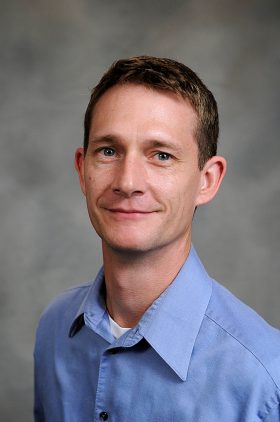In the most recent issue of Teaching German, the associate professor of German provides evidence that serious, sustained cultural study in beginning and intermediate language courses increases student engagement, enrollment persistence and students’ perceptions of the importance of language proficiency.
Associate professor of German Scott Windham recently wrote an article for Teaching German. The article, titled “Culture first: Boosting program strength through cultural instruction,” is based on four years of survey data among students in 100- and 200-level German courses at Elon. Windham developed the survey with the support of Elon’s Center for the Advancement of Teaching and Learning.

Recent theoretical scholarship has touted the benefits of this unified curricular approach. Windham’s study provides evidence that these benefits are real: students in first- and second-year German at Elon consistently reported that serious, sustained cultural study increased their levels of engagement, their willingness to continue studying German, and their perceptions of the relevance of German to their larger academic and career goals.
“Dr. Windham’s study validates the curricular turn we’ve taken in the Department of World Languages and Cultures,” says Brandon Essary, assistant professor of Italian at Elon and associate chair of the department. “Even in introductory language courses, our students study the topics and ideas that engage us as scholars. That helps infuse a sense of intellectual vitality and excitement throughout the entire department.”
In the article, Windham gives an example of how this curricular approach works in first-semester German, a course in which the language barrier would appear to make serious cultural study and critical thinking impossible. On the first day of German 121, students learn enough German to describe their pre-existing impressions of Germany and the Germans. Students then gradually learn the language structures necessary to test the accuracy of their initial statements, by studying photographs, statistical data, and short videos and articles in German.
By the end of the semester, students write page-long essays comparing this real-world evidence to common (mis-)conceptions about landscape and cities, cuisine, social practices, holidays and festivals, language use, and so on. Some impressions (e.g. beer consumption) are corroborated by the evidence, while others are upended, and in either case, students are able to draw evidence-based conclusions about their presuppositions. By thinking critically about culturally-determined language use, social practices, and foreign ways of thinking, students pursue intercultural competency in the first semester of German.
This cultural-analytical approach continues throughout the first four semesters and beyond. By the end of fourth-semester German, students critically engage a variety of texts—which might include literary works, full-length films, and symbolically rich spaces such as the Brandenburg Gate—while also reflecting on the interplay between language, perception and cognition, and individual and national identities.
Essary says this curricular approach is one of the factors in German’s success. “Elon boasts one of the few growing German programs in the country,” he says. “Enrollments are up 500% since the year 2000, course sections have increased from 3 per year to 10, the faculty has grown from one part-timer to two full-timers, and five courses have been added to the curriculum since 2002.”
Students and alumni increasingly use high-level German, from graduate degrees to RISE science research internships to Fulbright teaching stints to the Congress-Bundestag Exchange. “Curriculum doesn’t entirely explain these successes,” says Essary, “but it is a factor. When students are engaged intellectually from the first day of their language study, it sets them on a path. They can begin to envision a future in which they use that language.”


